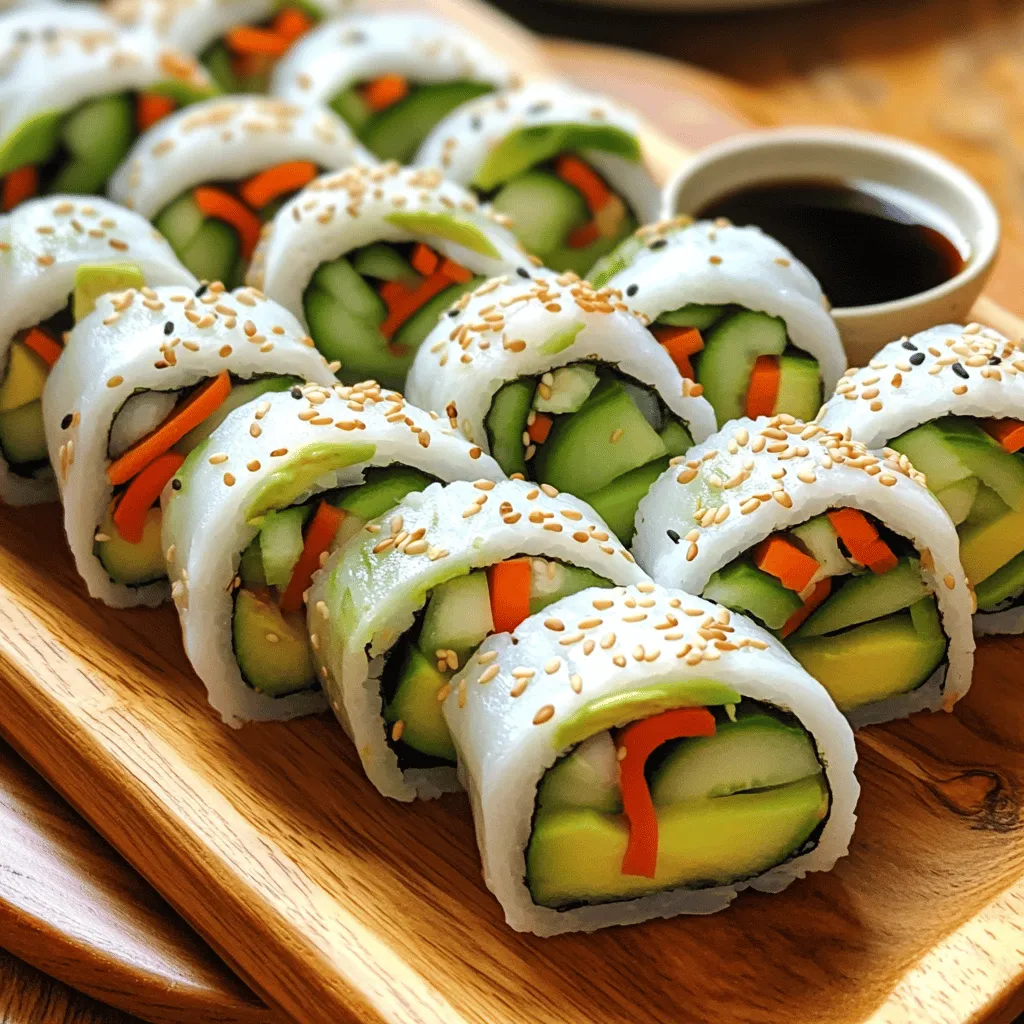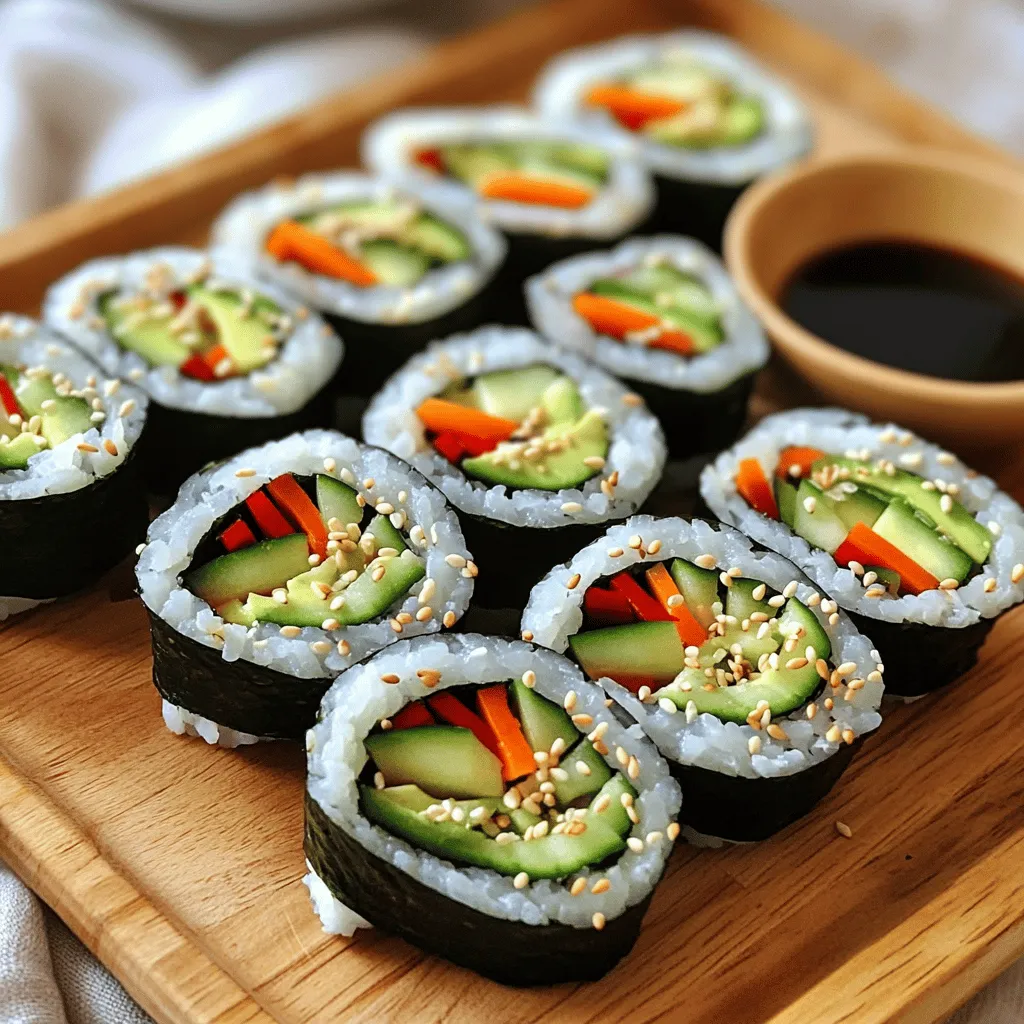Ready to roll? In this easy-to-follow guide, you’ll learn how to create delicious veggie sushi rolls at home. Packed with fresh flavors, this recipe is simple and healthy. I’ll walk you through the key ingredients, step-by-step instructions, and helpful tips. Whether you’re a sushi pro or a beginner, you can impress your friends and family with this refreshing treat. Let’s dive into the vibrant world of homemade sushi!
Ingredients
List of Required Ingredients
– 1 cup sushi rice
– 1 ¼ cups water
– 2 tablespoons rice vinegar
– 1 tablespoon sugar
– ½ teaspoon salt
– 4 sheets nori (seaweed)
– 1 small cucumber, cut into thin matchsticks (julienned)
– 1 small carrot, cut into thin matchsticks (julienned)
– 1 ripe avocado, sliced into even strips
– ¼ red bell pepper, cut into thin matchsticks (julienned)
Optional Ingredients
– 2 tablespoons sesame seeds (toasted, if desired)
– Soy sauce, for serving
When choosing your ingredients, fresh is key. Sushi rice is sticky and perfect for rolling. The water helps cook the rice just right. Rice vinegar adds a nice tang, and sugar balances the flavor. Salt enhances all the tastes. Nori sheets give structure and flavor. Fresh veggies add crunch and color. I love using cucumber, carrot, avocado, and red bell pepper. They make each bite bright and tasty.
You can add toasted sesame seeds for a nutty flavor. Soy sauce is great for dipping, too! Remember, the more fresh and colorful your ingredients, the better your sushi rolls will taste.
Step-by-Step Instructions
Preparing the Sushi Rice
Rinsing the Rice
Start by rinsing your sushi rice under cold water. Use a fine-mesh strainer for this. Rinse until the water runs clear. This removes extra starch and helps the rice cook well. After rinsing, drain the rice completely.
Cooking Method
In a medium saucepan, combine the rinsed rice and 1 ¼ cups of water. Bring this mix to a boil over high heat. Once boiling, reduce the heat to low. Cover it with a lid and let it simmer for 18-20 minutes. The rice should absorb all the water and become soft.
Making the Vinegar Mixture
Combining Ingredients
While your rice cooks, make the vinegar mixture. In a small bowl, mix 2 tablespoons of rice vinegar, 1 tablespoon of sugar, and ½ teaspoon of salt. You can heat this mix in the microwave for about 15-20 seconds. This helps the sugar dissolve easily.
Cooling Process
Once the sugar dissolves, let the vinegar mix cool down a bit. After the rice is done cooking, transfer it to a large bowl. Gently fold the vinegar mix into the rice using a spatula. Be careful to keep the rice fluffy. Now set the bowl aside to cool to room temperature.
Rolling the Veggie Sushi
Assembling the Ingredients
To roll your sushi, first prepare your workspace. Lay a sheet of nori, shiny side down, on a bamboo sushi mat or a flat surface. Dampen your hands with water to avoid sticky rice. Take a handful of rice and spread it evenly on the nori. Leave about an inch at the top edge.
Next, arrange your fillings in the center of the rice. Use thin matchsticks of cucumber, carrot, avocado, and bell pepper for a nice crunch. For extra flavor, sprinkle some sesame seeds over the veggies.
Rolling Technique
Begin rolling the sushi away from you, using the bamboo mat for help. Start from the edge closest to you. Press gently but firmly to make a tight roll. When you reach the exposed edge of the nori, moisten it slightly with water. This helps seal the roll.
Repeat this process with the other nori sheets and fillings. Once all rolls are made, slice them into bite-sized pieces. Use a sharp knife and wipe it with a damp cloth between cuts to keep the slices clean. Serve your rolls on a lovely platter with soy sauce on the side for dipping.
Tips & Tricks
Choosing Fresh Vegetables
When making veggie sushi, fresh vegetables make a big difference. Use crisp, bright veggies for the best flavor. Here are some top choices:
– Cucumber
– Carrot
– Avocado
– Red bell pepper
These veggies add color and taste. You can also try radishes or zucchini. Always check for freshness. In-season veggies taste best. Spring brings tender asparagus, while summer offers juicy tomatoes. Fall is great for colorful peppers. Winter gives us sweet butternut squash. Choose what’s fresh to enhance your rolls.
Rolling Techniques
Rolling sushi can seem tricky, but you can master it. A bamboo mat helps a lot. It keeps your rolls tight and even. Here’s how to roll properly:
1. Place the nori on the bamboo mat, shiny side down.
2. Wet your hands to stop the rice from sticking.
3. Spread sushi rice evenly, leaving space at the top.
For tight rolls, start rolling from the edge closest to you. Use gentle pressure to keep everything in place. Moisten the nori edge before sealing. This helps the roll stay tight and secure.
Serving Suggestions
Serving your sushi well makes it even more fun. You can place your rolls on a nice platter. Cut them into bite-sized pieces for easy eating. Here are some ideas to make it special:
– Arrange with colorful garnishes, like sliced radishes or herbs.
– Serve with soy sauce for dipping.
You can also add pickled ginger or wasabi for extra flavor. These toppings enhance the overall experience. Enjoy your creation with friends or family. Sharing makes it even better!

Variations
Creative Filling Ideas
For your veggie sushi rolls, feel free to mix and match ingredients. Here are some great ideas:
– Other Vegetable Options: Try using bell peppers, zucchini, or sweet potato. These add color and crunch.
– Adding Proteins: You can add tofu, tempeh, or edamame. This boosts protein and makes your rolls heartier.
Sushi Styles
Sushi comes in many styles. Here are two popular ones:
– California Rolls: These rolls often have imitation crab and avocado. They are sweet and creamy, perfect for beginners.
– Temaki (Hand Rolls): These are cone-shaped and easy to hold. Just fill the nori with rice and veggies, then roll it up!
Dietary Adjustments
You can easily adjust your sushi for different diets. Here are some tips:
– Vegan Options: All the ingredients in your rolls can be vegan. Use plant-based fillings and sauces.
– Gluten-Free Soy Sauce Choices: Regular soy sauce has gluten. Look for tamari or coconut aminos instead. These options taste great and keep it gluten-free.
Feel free to explore these variations to make your sushi unique and delicious!
Storage Info
Storing Leftover Sushi
Sushi is best fresh, but you can save leftovers. Wrap each roll in plastic wrap. This keeps the rolls moist and prevents them from drying out. Place them in an airtight container. Store the container in the fridge.
– Best Practices for Refrigeration
– Wrap rolls tightly in plastic wrap.
– Use an airtight container to keep them fresh.
– Keep sushi in the fridge, not at room temperature.
– How Long Sushi Lasts
Sushi lasts for about 24 hours in the fridge. After that, it may lose flavor and texture. Always check for any signs of spoilage before eating.
Reheating Tips
You might wonder if you can reheat sushi. In general, sushi is best enjoyed cold. However, if you want to warm it, here are some tips.
– Can You Reheat Sushi?
Yes, but it is not always recommended. Reheating can change the texture of the fish and rice.
– Recommended Methods
If you decide to reheat, use a microwave. Place sushi on a plate. Cover it with a damp paper towel. Heat in short bursts of 10-15 seconds. Check after each burst to avoid overheating. Enjoy your veggie sushi rolls at room temperature for the best taste!
FAQs
How to prevent sushi rice from sticking?
To stop sushi rice from sticking, dampen your hands. Wet hands help keep the rice from clumping. You can also rinse the rice well before cooking. This helps remove excess starch. A little water goes a long way in making sushi fun to roll.
Can I make veggie sushi rolls ahead of time?
Yes, you can prepare veggie sushi rolls ahead of time. Just keep them in the fridge. Wrap rolls in plastic wrap to keep them fresh. Use them within a day for the best taste. If you make them too early, the rice may harden.
What can I substitute for nori?
If you can’t find nori, use lettuce leaves or rice paper. These options add a crisp taste. You can also use thin slices of cucumber as a wrap. Each choice provides a unique flavor and texture. Enjoy experimenting with different wraps!
In this blog post, we explored the key ingredients and steps needed to make delicious veggie sushi. You learned how to prepare rice, mix the vinegar, and roll your sushi tightly. We shared tips on choosing fresh vegetables, variations of sushi styles, and how to store leftovers.
Consider trying different fillings and styles to make your sushi unique. Enjoy the process, and soon you’ll impress friends with your homemade sushi!




